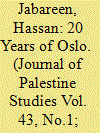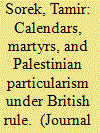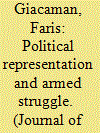| Srl | Item |
| 1 |
ID:
128073


|
|
|
|
|
| Publication |
2014.
|
| Summary/Abstract |
The Oslo accords have been the subject of considerable debate ever since the
first agreement was signed in 1993. Most of the literature on the agreements
has dealt with their impact on the occupied territories (e.g. the growth of
settlements, the separation barrier, restrictions on movement), to the near
exclusion of the situation inside the Green Line. This essay, by contrast, focuses
on Oslo's consequences with regard to the status of the Palestinian citizens of
Israel, and the way that the conflict is conceptualized by Israeli Jewish society.
|
|
|
|
|
|
|
|
|
|
|
|
|
|
|
|
| 2 |
ID:
128070


|
|
|
|
|
| Publication |
2014.
|
| Summary/Abstract |
This article explores how political calendars and shared martyrology provided
important markers of identity and symbolic tools for political mobilization in
Mandate Palestine. The dates on the emerging Palestinian calendar grew out of
the politicization and nationalization of traditional holy days, as well as the
commemoration of politically significant events of the period, including those
involving local Palestinian martyrs.
|
|
|
|
|
|
|
|
|
|
|
|
|
|
|
|
| 3 |
ID:
128075


|
|
|
|
|
| Publication |
2014.
|
| Summary/Abstract |
The extensive literature on trauma, social suffering, memory and loss has so far
excluded consideration of the Palestinian Nakba, in spite of its place in world
politics, its many similarities to other cases of social suffering, and the unusual
feature of its continuation and escalation more than sixty years after the
expulsion of Palestinians from their homeland. This paper examines this exclusion
through reviewing the genealogy, theoretical orientations, and institutional
supports of the "trauma genre,"from its crystallization in the early 1990s, through
its expansion up to today. The idea of the way the communication of suffering
is facilitated within "moral communities" is invoked as one kind of explanation
of the trauma genre's failure to consider the Nakba.
|
|
|
|
|
|
|
|
|
|
|
|
|
|
|
|
| 4 |
ID:
128072


|
|
|
|
|
| Publication |
2014.
|
| Summary/Abstract |
In 1974, both the Arab League and the United Nations recognized the Palestine
Liberation Organization (PLO) as the "sole, legitimate representative of the
Palestinian people." This article explores the dynamic history of the PLO's
methods of political representation from its establishment in 1964 through the
height of the armed struggle in the mid-seventies. Contrasting fedayee theories
of political representation with their practice, the author draws upon a range
of ideological documents produced by different guerrilla factions, as well as
accounts from prominent actors in the movement.
|
|
|
|
|
|
|
|
|
|
|
|
|
|
|
|
| 5 |
ID:
128076


|
|
|
|
|
| Publication |
2014.
|
| Summary/Abstract |
With all of Syria engulfed since spring 2011 in spiraling destruction, the fate of the
country's small Palestinian population receives scant attention. This report
focuses on that community through the lens of Damascus's Yarmuk camp, the
largest Palestinian concentration in the country. Starting with the 2011 Nakba
and Naksa Day demonstrations, the report provides a detailed account of how
the camp has lived the turmoil, highlighting in particular its determined efforts
to preserve its neutrality and the factors that ultimately led to the fatal entry of
the Free Syrian Army (FSA) into Yarmuk in December 2012. The ethnographic
portrait of Syria's Palestinians before the uprising, their life in the camp
(including the role of the factions), their privileges and unique integration, makes
what the author sees as the destruction of the community even more tragic.
|
|
|
|
|
|
|
|
|
|
|
|
|
|
|
|